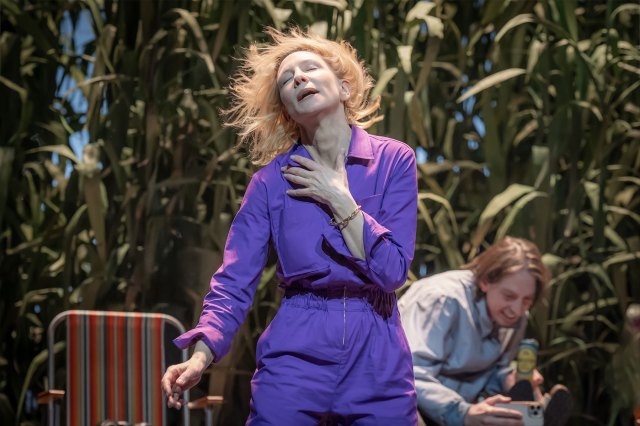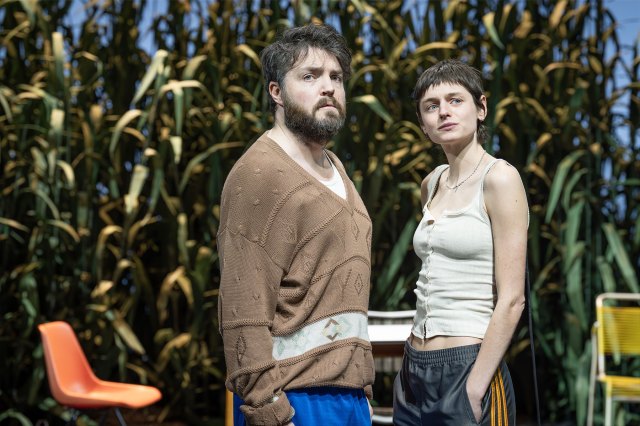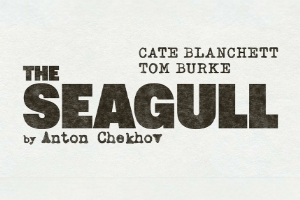The Seagull review – Cate Blanchett leads an all-star production with vaping and rock songs
Thomas Ostermeier’s take on the Chekhov classic runs at the Barbican Theatre until 5 April

“Who wants a bit of Chekhov, then?” asks Zachary Hart cheekily, after arriving on the Barbican stage on a quad bike and before taking up an electric guitar to play Billy Bragg’s “The Milkman of Human Kindness”. “This one’s for Thomas Ostermeier,” he adds, as he unleashes his inner rock god.
The answer seems to be everyone. The Seagull, with an all-star cast headed by Cate Blanchett, Tom Burke, Emma Corrin and Kodi Smit-McPhee, has been one of the hottest tickets in town for a while now. All the build-up has promised irreverence, a blowing away of the dust surrounding this famous 1895 drama: a contemporary setting, characters vaping and swearing, rock songs, microphones.
Yet the really surprising thing about director Ostermeier’s superb production, in a magnificent adaptation by him and playwright Duncan Macmillan, is just how serious and sensitive it is in unpicking both the comic and tragic notes in Chekhov’s study of a group of unhappy, arty, self-obsessed people who can’t make any sense of their lives in a time of crisis – and have a miserable habit of falling in love with the wrong person.
It very deliberately circles issues of artifice and reality, of true feelings and performance, of the very purpose of art, enfolding the audience in its examination. It feels urgent, present. The house lights come up as Burke’s writer Trigorin, reconfigured here as the kind of successful writer whose books “people buy in airports”, comes forward to exclaim: “Art has never been less relevant than it is now, and my art is the least relevant of all. The only way a book could change the world nowadays is if it’s lit on fire and hurled through a window.”
That’s the underlying theme to all the action, set by designer Magda Willi on a bare stage, dominated by a huge patch of rustling reeds, from which characters suddenly emerge. Atmosphere is provided by Bruno Poet’s changeable lighting, which, as the story progresses, makes the greenery cast dark shadows, enclosing the scene.
It works surprisingly effectively, making the lakeside where Corrin’s Nina presents an avant-garde play by Kostya (an anxiously vulnerable Smit-McPhee) the centre of the action as well as the mood. It’s here that Blanchett’s monstrously self-absorbed actress Irina Arkadina first appears in a purple jumpsuit and shades (costumes by Marg Horwell) to take the spotlight onto herself and wreak chaos in the lives around her.
Ostermeier makes fascinating choices in how he presents the interplay of ideas as well as the skein of relationships. By making Kostya’s creation a piece designed to be viewed through Virtual Reality headsets (Irina, characteristically, fails to put hers on), he suggests that it might be a visionary creation that attempts to address the end of the world in new ways. It might actually be art that matters.
In the same way, when Corrin’s Nina begins to fall for Burke’s slightly clumsy, withdrawn Trigorin, the director creates a long, rapturous interlude of silent conversation, flooded by music and sunlight, in which it becomes clear that the initial attraction between them partly springs from the way she makes him feel his writing is worth something. And it could be, since he writes about love – which is also Chekhov’s theme.
The detail of this approach plays wonderful dividends with all the characters, letting the humour – and it is really funny – bubble gently from their interactions. Corrin’s Nina is a wonder, attractive, flirtatious, uncertain, but nobody’s fool. The sheer vivacity of their earlier appearances makes the character’s ultimate distraction all the sadder. In the same way, Burke’s Trigorin isn’t just a slick chancer, but an indecisive man bumbling his way towards decisions, shambling in trainers and shorts, anxious not to offend Irina but not entirely enamoured of her.

As Sorin, Irina’s brother and a former civil servant, Jason Watkins is both comic and kind, coming to terms with the fact that his own dreams of being a writer will come to nothing, failing in health but striving to protect and nurture Kostya. Smit-McPhee, making his stage debut, is consciously tender towards him, while Tanya Reynolds’ Masha – a woman famously in mourning for her life – is so in love with Kostya that it makes her physically restless, unhappiness running up and down her body, her face a changing screen of frustrated reactions.
As her wannabe lover Simon, Hart is foolish but honest, another kindly figure in a world that lacks them. Priyanga Burford and Paul Higgins as Masha’s mismatched parents and Paul Bazely as the fatally charming and weak Dorn are equally carefully drawn, their interventions often humorous, always human. It’s all perfectly poised and deep.
At the heart of it all is Blanchett’s Irina, a performance of massive intent, her histrionic interventions constantly drawing attention to the character’s terrifying, egotistical needs. Where much of the action is detailed, this is a huge characterisation, impressively physically adept – there’s one glorious moment where she sprawls on the floor in dismay and then gently pulls a suitcase under her head so she is comfortable. At another, she does the splits in sequinned trousers while proclaiming: “I never think about the future.”
In refusing the claims of young people and preserving her own eternal youth, she does – as Kostya suggests – make herself obsolete. She is a caricature of what she could have been. Blanchett catches all the farce of that, but not quite the sadness underlying it. The production draws on her energy, but it’s at its most fascinating when its lesser characters are in play.
















